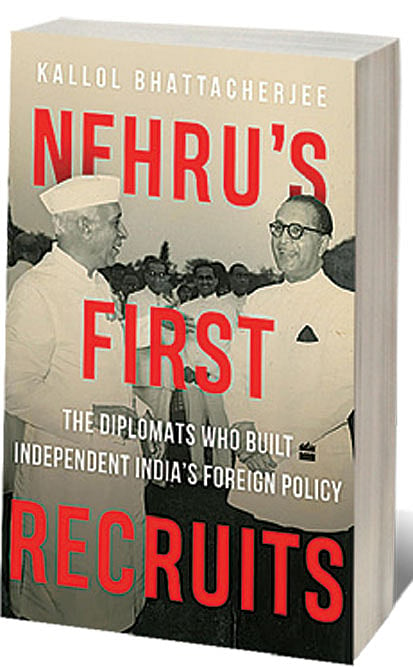India International

‘THE HISTORY OF Services’ is an essential document for civil servants in India. It ranks members of each cadre in order of seniority as well as giving an outline of their career. For civil servants it is a vital document to know where you stand in the pecking order, who is retiring when and what opportunities lie ahead because of tenures coming to an end, promotions etc. This bureaucratic Bible has become, in the hands of Kallol Bhattacharya, a journalist specialising in foreign affairs, an entry point to explore India’s diplomatic history.
A chance encounter with ‘The History of Services’ of the Indian Foreign Service for the year 1957 provided Bhattacharya the substance for Nehru’s First Recruits— those who populated the Indian Foreign Service (IFS) in the first decade post-independence. The newly created Indian Foreign Service was in those initial years a diverse group. Most prominent in it were those officers of the Indian Civil Service who either opted to join the IFS or were handpicked for it. Then there were the young recruits who joined through a stiff competitive examination and in the decades to follow came to constitute the vast bulk of the IFS. In between was a mixed bag—some politicians, journalists, a sprinkling of officers of the former Indian national Army, some from princely families etc. There were also a significant number from other government departments—the clerks and stenographers who constituted the backbone of the IFS (B). A few of them would end their careers as Ambassadors themselves.
Diversity then marked most strongly Nehru’s first diplomats as Bhattacharya ably brings out. What is also striking about this cohort is the wide span of 20th and early 21st century history it would interface with. Some joined government service during the high noon of empire and were in senior positions at the peak of their careers as it tottered and finally disappeared and unleashed a wider process of global decolonisation. Others who joined as fresh recruits post 1947 saw through their service tenures multiple wars and conflicts, the emergence of Bangladesh; from the assassinations and civil strife that mirrored 1947, the nuclearisation of South Asia and sea changes in Indian foreign policy from non-alignment to multi alignment and strategic autonomy. The cohort itself then presents a slice of India’s diplomatic history.
AIming High
20 Feb 2026 - Vol 04 | Issue 59
India joins the Artificial Intelligence revolution with gusto
Reflections, memories of family members and career trajectories overall make for an animated and lively narrative. We encounter PRS Mani in Indonesia as the Dutch try to reassert control over their former colony; Brijesh Mishra in Beijing in the late 1960s reading the tea leaves to see if the Chinese were indicating a thaw; the glass ceiling CB Muthamma an early IFS women officer constantly confronted; Mira Ishardas Malik, a gifted China expert who had to resign because she got married; Eric Gonsalves struggling to protect the interests of Indian nationals in Burma; Pradyumna Sinhji from a Rajput princely state in Gujarat who criticised his own government’s policy on Vietnam; Surendra Singh Alirajpur another dissentient royal who criticised the revocation of the privy purses— these are amongst the many characters who populate this book making for an engrossing read.
It is also good that Bhattacharya has not omitted those in the IFS who remain generally in the shadows—the stenographers and the clerical cadres in the IFS (B). SJ Wilfred was in the accounts department but was transferred to the MEA in 1947.Posted in 1949 to the Indian mission in Kathmandu, as a junior diplomat he was witness to a bizarre internal crisis when the King of Nepal along with his son and heir sought sanctuary in the Embassy.
Inevitably in a book such as this, there will be omissions and there are some. The young MA Rahman in Budapest in 1956 gave sanctuary and support to dissidents facing Soviet tanks and one of them went on to become president of Hungary and never forgot Rahman’s role. Perhaps other books will address those. For this reviewer it was satisfying to encounter in print anecdotes and stories that comprise the inherited lore and historical memory of the IFS.

